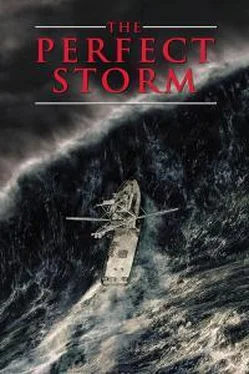Sebastian Junger - The Perfect Storm
Здесь есть возможность читать онлайн «Sebastian Junger - The Perfect Storm» — ознакомительный отрывок электронной книги совершенно бесплатно, а после прочтения отрывка купить полную версию. В некоторых случаях можно слушать аудио, скачать через торрент в формате fb2 и присутствует краткое содержание. Жанр: Триллер, Проза. Описание произведения, (предисловие) а так же отзывы посетителей доступны на портале библиотеки ЛибКат.
- Название:The Perfect Storm
- Автор:
- Жанр:
- Год:неизвестен
- ISBN:нет данных
- Рейтинг книги:3 / 5. Голосов: 1
-
Избранное:Добавить в избранное
- Отзывы:
-
Ваша оценка:
- 60
- 1
- 2
- 3
- 4
- 5
The Perfect Storm: краткое содержание, описание и аннотация
Предлагаем к чтению аннотацию, описание, краткое содержание или предисловие (зависит от того, что написал сам автор книги «The Perfect Storm»). Если вы не нашли необходимую информацию о книге — напишите в комментариях, мы постараемся отыскать её.
The Perfect Storm — читать онлайн ознакомительный отрывок
Ниже представлен текст книги, разбитый по страницам. Система сохранения места последней прочитанной страницы, позволяет с удобством читать онлайн бесплатно книгу «The Perfect Storm», без необходимости каждый раз заново искать на чём Вы остановились. Поставьте закладку, и сможете в любой момент перейти на страницу, на которой закончили чтение.
Интервал:
Закладка:
It was around this time that Cape Ann was first sighted by Europeans. In 1605, the great French explorer Samuel de Champlain was working his way south from Casco Bay, Maine, when he rounded the rock ledges of Thatcher's, Milk, and Salt islands and cast anchor off a sandy beach. The natives drew for him a map of the coastline to the south, and Champlain went on to explore the rest of New England before returning to Cape Ann the following year. This time he was clawing his way up the coast in some ugly fall weather when he sought shelter in a natural harbor he'd missed on his previous trip. He was greeted by a party of Abenaki Indians, some of whom wore the scraps of Portuguese clothing they had traded for a hundred years before, and they made a great show of hospitality before launching a surprise attack from the woods of Eastern Point. The Frenchmen easily fended them off and on the last day of September, 1606, with the Indians waving goodbye from the shore and the oaks and maples rusting into their fall colors, Champlain set sail again. Because of the sheltered coves and thick shellfish beds he called the place "Beauport"—The Good Harbor. Seventeen years later a group of
Englishmen sailed into Beauport, eyed the local abundance of cod, and cast their anchor. The year was 1623.
The ship was financed by the Dorchester Company, a group of London investors that wanted to start tapping the riches of the New World. Their idea was to establish a settlement on Cape Ann and use it to support a fleet of boats that would fish all spring and summer and return to Europe in the fall. The shore crew was charged with building a habitable colony and drying the catch as it came in. Unfortunately, luck was against the Dorchester men from the start. The first summer they caught a tremendous amount of fish, but the bottom dropped out of the cod market, and they didn't even make expenses. The next year prices returned to normal, but they caught almost no fish at all; and the third year violent gales damaged the boats and drove them back to England. The company was forced to liquidate its assets and bring its men home.
A few of the settlers refused to leave, though. They combined forces with a band of outcasts from the tyrannical Plymouth colony and formed the nucleus of a new colony at Gloucester. New England was an unforgiving land in those days, where only the desperate and the devout seemed to survive, and Gloucester wound up with more than its share of the former. Its most notorious citizen was the Reverend John Lyford, whose deeds were so un-Christian—he criticized the Church and groped a local servant girl—as to be deemed unprintable by a local historian; another was a "shipwrecked adventurer” named Fells who fled Plymouth to escape public whipping. His crime was that he'd had "unsanctioned relations" with a young woman.
Gloucester was a perfect place for loose cannons like Lyford and Fells. It was poor, remote, and the Puritan fathers didn't particularly care what went on up there. After a brief period of desertion, the town was re-settled in 1631, and almost immediately the inhabitants took to fishing. They had little choice, Cape Ann being one big rock, but in some ways that was a blessing. Farmers are easy to control because they're tied to their land, but fishermen are not so easy to control. A twenty-year-old off a three-month trip to the Banks has precious little reason to heed the bourgeois mores of the town. Gloucester developed a reputation for tolerance, if not outright debauchery, that drew people from all over the Bay Colony. The town began to thrive.
Other communities also had a healthy streak of godlessness in them, but it was generally relegated to the outskirts of town. (Wellfleet, for example, reserved an island across the harbor for its young men. In due time a brothel, a tavern, and a whale lookout were built there—just about everything a young fisherman needed.) Gloucester had no such buffer, though; everything happened right on the waterfront. Young women avoided certain streets, town constables were on the lookout for errant fishermen, and orchard owners rigged guns up to trip-wires to protect their apple trees. Some Gloucester fishermen, apparently, didn't even respect the Sabbath: "Cape Cod captains went wild-eyed in an agony of inner conflict," recorded a Cape Cod historian named Josef Berger, "as they read the Scriptures to their crews while some godless Gloucester craft lay in plain sight. .
. hauling up a full share of mackerel or cod."
If the fishermen lived hard, it was no doubt because they died hard as well. In the industry's heyday, Gloucester was losing a couple of hundred men every year to the sea, four percent of the town's population. Since 1650, an estimated 10,000 Gloucestermen have died at sea, far more Gloucestermen than died in all the country's wars. Sometimes a storm would hit the Grand Banks and half a dozen ships would go down, a hundred men lost overnight. On more than one occasion, Newfoundlanders woke up to find their beaches strewn with bodies.
The Grand Banks are so dangerous because they happen to sit on one of the worst storm tracks in the world. Low pressure systems form over the Great Lakes or Cape Hatteras and follow the jet stream out to sea, crossing right over the fishing grounds in the process. In the old days, there wasn't much the boats could do but put out extra anchor cable and try to ride it out. As dangerous as the Grand Banks were, though, Georges Bank—only 180 miles east of Cape Cod—was even worse. There was something so ominous about Georges that fishing captains refused to go near it for 300 years. Currents ran in strange vortexes on Georges, and the tide was said to run off so fast that ocean bottom was left exposed for gulls to feed on. Men talked of strange dreams and visions they had there, and the uneasy feeling that dire forces were assembling themselves.
Unfortunately, Georges was also home to one of the greatest concentrations of marine life in the world, and it was only a matter of time before someone tried to fish it. In 1827, a Gloucester skipper named John Fletcher Wonson hove-to off Georges, threw out a fishing line, and pulled up a halibut. The ease with which the fish had been caught stuck in his mind, and three years later he went back to Georges expressly to fish. Nothing particularly awful happened, and soon ships were going back and forth to Georges without a second thought. It was only a one-day trip from Gloucester, and the superstitions about the place started to fade. That was when Georges turned deadly.
Because the fishing grounds were so small and close to shore, dozens of schooners might be anchored within sight of each other on a fair day. If a storm came on gradually, the fleet had time to weigh anchor and disperse into deeper water; but a sudden storm could pile ship upon ship until they all went down in a mass of tangled spars and rigging. Men would be stationed at the bow of each boat to cut their anchor cables if another boat were bearing down on them, but that was usually a death sentence in itself. The chances of sailing clear of the shoal water were horribly small.
One of the worst of these catastrophes happened in 1862, when a winter gale bore down on seventy schooners that were working a closely packed school of cod. Without warning the sky turned black and the snow began to drive down almost horizontally. One fisherman described what ensued:
My shipmates showed no sign of fear; they were now all on deck and the skipper was keeping a sharp lookout. Somewhere about nine o'clock, the skipper sang out, "There's a vessel adrift right ahead of us! Stand by with your hatchet, but don't cut until you hear the word!" All eyes were bent now on the drifting craft. On she came, directly at us. A moment more and the signal to cut must be given. With the swiftness of a gull, she passed by, so near that I could have leaped aboard. The hopeless, terror-stricken faces of the crew we saw but a moment, as the doomed craft sped on her course. She struck one of the fleet a short distance astern, and we saw the waters close over both vessels almost instantly.
Читать дальшеИнтервал:
Закладка:
Похожие книги на «The Perfect Storm»
Представляем Вашему вниманию похожие книги на «The Perfect Storm» списком для выбора. Мы отобрали схожую по названию и смыслу литературу в надежде предоставить читателям больше вариантов отыскать новые, интересные, ещё непрочитанные произведения.
Обсуждение, отзывы о книге «The Perfect Storm» и просто собственные мнения читателей. Оставьте ваши комментарии, напишите, что Вы думаете о произведении, его смысле или главных героях. Укажите что конкретно понравилось, а что нет, и почему Вы так считаете.












